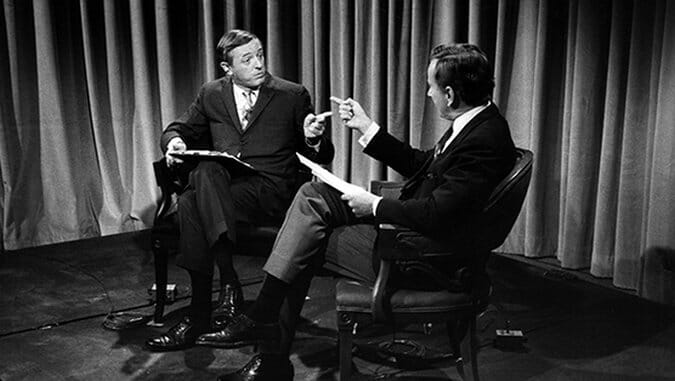Best of Enemies

So here we are, up to our elbows in the ignorance of polemic B.S., puzzling over when exactly America came to the saturation of Trumps and Huckabees braying cultural calumnies in the press. If you need a convenient scapegoat for all the jackasses jockeying for position in today’s presidential rodeo, maybe you should just blame ABC, the network that had the bright idea to pit William F. Buckley against Gore Vidal in televised debates more than 40 years ago. Did ABC know what they were doing when they staged that infamous verbal sparring match? Could they have predicted the far-reaching impact of their mad business stratagem?
Buckley and Vidal’s infamously grueling rhetorical slugfest is the subject of Robert Gordon and Morgan Neville’s new film, documentary Best of Enemies. Neville won the hearts and minds of arthouse audiences (as well as of the AMPAS voting body) in 2013 with 20 Feet from Stardom, a film that peers behind curtains in show biz to showcase the unsung performers responsible for buttressing the careers of our favorite singers. In Best of Enemies, Neville has teamed with Gordon to pull back a different curtain, one concealing the very real ugliness bubbling and boiling off-camera for the length of ABC’s attempt at spicing up the otherwise staid world of political commentary.
Not that there’s really much to conceal. Buckley, he of the great Republican ideal that might makes right, and Vidal, the polished, barbed-tongued author who never quite knew when to leave well enough alone, hated each other—they were the respective champions of the country’s intellectual right and left. In the film’s vast collection of archival clips, their shared rancor is impossible to ignore. The idea that two human beings could have such utter dislike and disregard for one another is nearly unthinkable, except that such animus clouds a shocking majority of our political discourse even in 2015. But Best of Enemies argues that that coarse brand of colloquy descends directly from ABC’s 1968 enterprise: In having Buckley and Vidal cross swords as part of the studio’s coverage of the Republican and Democratic National Conventions, so spawned the world of punditry we know and loathe now.
-

-

-

-

-

-

-

-

-

-

-

-

-

-

-

-

-

-

-

-

-

-

-

-

-

-

-

-

-

-

-

-

-

-

-

-

-

-

-

-








































